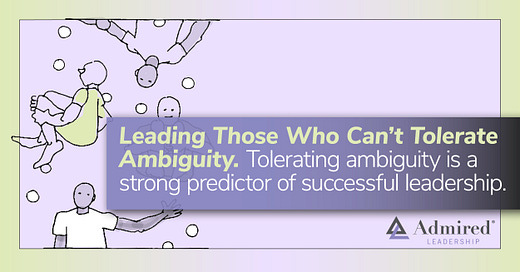Good leaders create clarity.
They know the ability for others to perform consistently at the highest level depends on a clarity of roles, responsibilities, and expectations.
Sometimes, clarity can be elusive. Leaders don’t always have the desired facts or data from which to ground their decisions, actions, and choices.
Ambiguity is more common than clarity in everyday life, especially in the workplace.
Good leaders understand that some team members are much better at tolerating ambiguity than others. For some, any lack of clarity makes them anxious and leaves them without a foundation from which to move forward successfully. They become paralyzed in their search for clarity and fail to make much progress until they have a clearer picture of what exactly is expected of them. Ambiguity makes them less effective.
Other team members prefer the autonomy and self-imposed control ambiguity affords. They create their own clarity by personally defining what matters and how to accomplish it. When the current reality is in flux, they don’t wait for the dust to settle. Instead, they pick a strategic goal and begin working toward achieving it. Ambiguity for these team members is freedom, not constraint.
Leading a team comprised of those who thrive in ambiguity and those who don’t is a challenging task for leaders. Understanding the need some team members have for certainty, good leaders require all team members to push past the first or easy answer and struggle through the complexity of a problem.
In groups, they know those who can’t tolerate ambiguity will detest working through an issue or when the team fails to reach a conclusion. Good leaders insist they stay with the decision process no matter how long it takes. They ask everyone to reject black-and-white answers and quick conclusions, knowing they are likely a reflection of how people handle ambiguity.
Obviously, leaders who themselves can’t stomach ambiguity are at a huge disadvantage in helping others through the maze of uncertainty. Maybe that’s why tolerating ambiguity is such a strong predictor of successful leadership.




What are some practices that increase a person's ability to tolerate more ambiguity?
My wife rolling her eyes and saying "just be ok with it" doesn't seem to work for me. (:
Does tolerating ambiguity coincide with both Openness and Agreeableness in the Big Five personality traits? If so, I wonder if an Openness and Agreeableness combination also is a strong predictor of successful leadership?